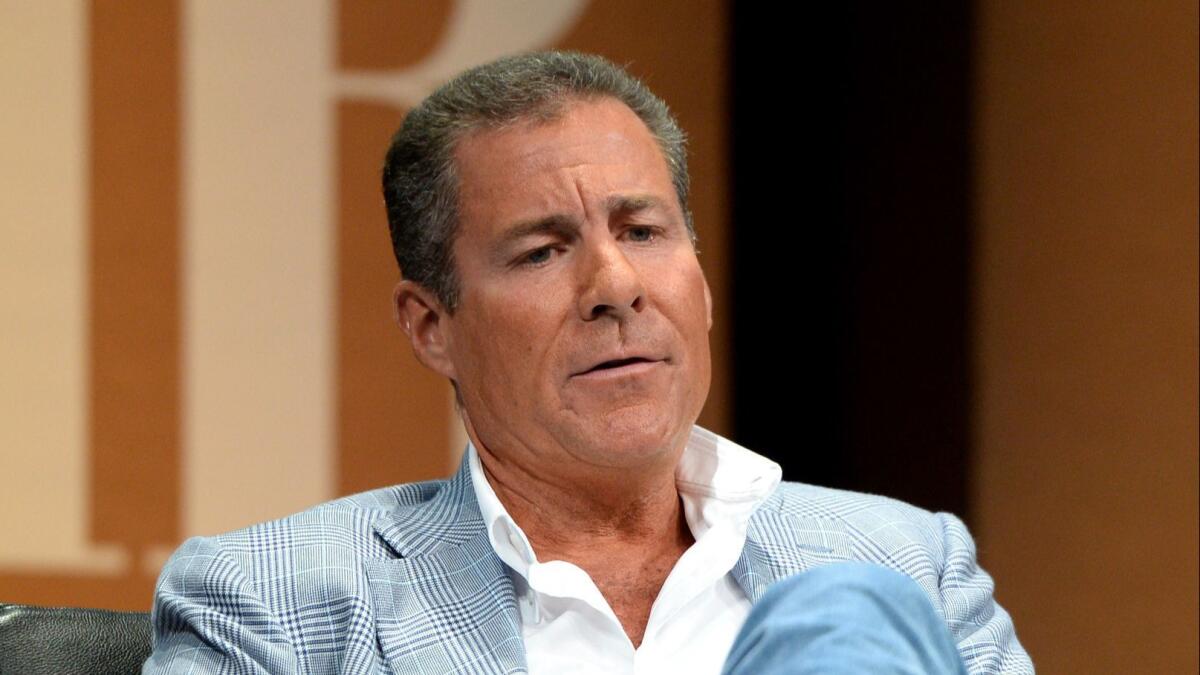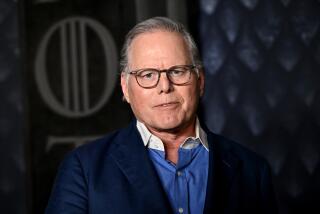HBO’s Richard Plepler, tastemaker behind TV hits like ‘Game of Thrones, quits

In a major television industry shakeup, HBO Chairman and Chief Executive Richard Plepler is stepping down after spending 27 years molding the premium cable network into the industry’s tastemaker with such groundbreaking shows as “Game of Thrones,” “Silicon Valley” and “Last Week Tonight With John Oliver.”
Plepler’s exit had been in the works for nearly a month and follows AT&T’s takeover last year of Time Warner Inc., which had been the parent company of HBO, CNN and Warner Bros. studio. The Dallas-based telecommunications giant is moving to quickly to put its own stamp on the company, which it rebranded WarnerMedia, and it is expected to centralize operations.
Plepler’s departure comes at a pivotal time for HBO, which is facing enormous pressure from Netflix and Amazon.com, which have deep pockets and aspirations to be the destination for consumers looking for premium TV programming.
Netflix is spending billions of dollars more than its rivals to buy shows, and HBO in the last year has lost some ground as it tries to maintain marquee talent. For example, Nicole Kidman, who starred in HBO’s “Big Little Lies,” recently signed a television production deal at Amazon Studios, while her co-star Reese Witherspoon struck a partnership with Apple Inc., which is trying to ramp up its TV output.
An urbane showman with bona fides in New York’s cultural and literary scene, Plepler recognized that the new corporate brass were planning major changes for HBO and that he would not have the autonomy he had long enjoyed, according to people familiar with his thinking who were not authorized to comment. The 59-year-old executive concluded that he should go before the situation became awkward, these people said.
The announcement comes just two days after AT&T finally received a judicial blessing to complete its $85-billion takeover of Time Warner. For months, AT&T had been in a holding pattern when it came to executive moves because it was prevented from making structural changes while the U.S. Justice Department sought to block the merger.
WarnerMedia CEO John Stankey had previously signaled that changes were afoot at HBO, which long had been accustomed to operating with little interference from its corporate owners.
“It’s going to be a tough year,” Stankey said in a meeting with employees last summer. “It’s going to be a lot of work to alter and change direction a little bit.”
AT&T expedited its search for a new leader in recent weeks and is in advanced talks with Bob Greenblatt, who last fall stepped down as NBC Entertainment chairman, according to three people with knowledge of the situation who were not authorized to comment.
Greenblatt, who could take over as early as next week, would have a more expansive portfolio than Plepler. He would be in charge of HBO and the Turner entertainment channels, TNT, TBS and Tru television, as well as the planned new streaming service, which is expected to launch this year.
In the past, Time Warner kept separate its three divisions — HBO, Turner and Warner Bros. AT&T plans to consolidate the television networks.
Plepler announced the move Thursday in a memo to his staff:
“My dad always gave the best advice. Whenever there was a difficult decision to make, he counseled that since no one could ever have perfect visibility into the future, the best thing you could do was trust your instincts,” he wrote. “It has been a touchstone for me throughout my life. … Hard as it is to think about leaving the company I love, and the people I love in it, it is the right time for me to do so.”
Plepler leaves after helping build HBO into a cultural juggernaut. Since taking over as CEO in 2013, he has presided over a period of subscription growth at HBO and sister channel Cinemax, with the addition of nearly 40 million subscribers, to nearly 140 million. HBO channels’ revenue during his tenure grew by $2 billion, a 40% increase, to $6.6 billion, according to HBO.
He also spearheaded the launch of HBO on digital platforms, including Amazon.com and Hulu, as well as creating the stand-alone streaming service HBO Now. The digital push resulted in 7 million additional subscribers and has brought in more than $1 billion in annual revenue.
“Richard is one of the most successful executives in our industry and I have been fortunate to have his support over the last months,” Stankey, a longtime AT&T executive, said in a statement. “His vision, energy and passion helped to elevate HBO’s brand to what it has become today.”
Nonetheless, industry insiders have long expected a culture clash between the buttoned-up Stankey and Plepler, who loves to throw extravagant parties to celebrate HBO, leading to rumors in recent weeks that winter might be coming for the HBO chief.
In the six years that Plepler ran New York-based HBO and Cinemax, HBO earned 165 Emmy Awards, with wins in all major categories. The network also netted nine Golden Globe Awards. Last year, however, HBO tied Netflix for Emmy wins, with each winning 23, underscoring the rising competition in television.
Plepler’s rise in the industry was the stuff of an HBO documentary. In the early 1980s, when he was in his 20s, the native of Manchester, Conn., worked as a staffer in the office of then-Sen. Christopher Dodd (D-Conn.). He caught his boss’ attention by waiting hours to share his ideas about U.S.-Israeli relations. He moved to New York in the mid-1980s and opened a public relations firm. He landed a job at HBO in 1992 and worked with then-CEO Jeff Bewkes, who went on to run Time Warner until the sale to AT&T last year.
“It’s a journey of great pride and accomplishment because so many of you, and many others before us, have made HBO a cultural and business phenomenon,” Plepler wrote in his memo. “Thanks to all of you, we are today churning on all cylinders both creatively and as a business. Thanks to all of you, I can move on to the next chapter of my life knowing that the best team in the industry remains here to carry on our continued progress and success.”
Twitter: @MegJamesLAT
Times staff writer Ryan Faughnder contributed to this report.
More to Read
Inside the business of entertainment
The Wide Shot brings you news, analysis and insights on everything from streaming wars to production — and what it all means for the future.
You may occasionally receive promotional content from the Los Angeles Times.











